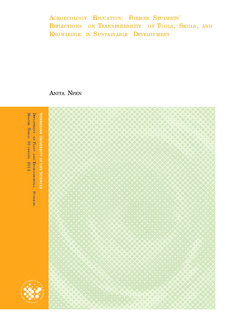Agroecology education : former students' reflections on transferability of tools, skills and knowledge in sustainable development
Master thesis
Permanent lenke
http://hdl.handle.net/11250/189531Utgivelsesdato
2013-03-22Metadata
Vis full innførselSamlinger
- Master's theses (IPM) [204]
Sammendrag
A change in the common education strategy is vital for securing an environmentally,
economically, and socially viable future for the food system. This is a case study of how
concepts within the education for sustainable development (ESD) framework are applied in
the graduate agroecology programme at the Norwegian University of Life Sciences (UMB).
Which elements of agroecology education are transferable in working lives, how effective
learning strategies are for developing reflective lifelong learners, and how former students are
able to partake in the sustainable development of the food system are examined. Semistructured
in-depth interviews were conducted with five former students. While the initial
motivation for studying agroecology mainly were interests in thematic areas of food system
functioning or agriculture, participants gained methodological skills, tools and knowledge
related to lifelong learning and transferable systems analysis, which to varying degrees they
apply to their working lives. Students generally found open-ended learning effective. The
study illustrated the negative consequences of the lack of a strong agroecology identity, which
may be strengthened by linking agroecology formally to the global ESD approach. A whole
school approach to ESD will strengthen the programme’s ability to develop reflective
practitioners in sustainable development.
